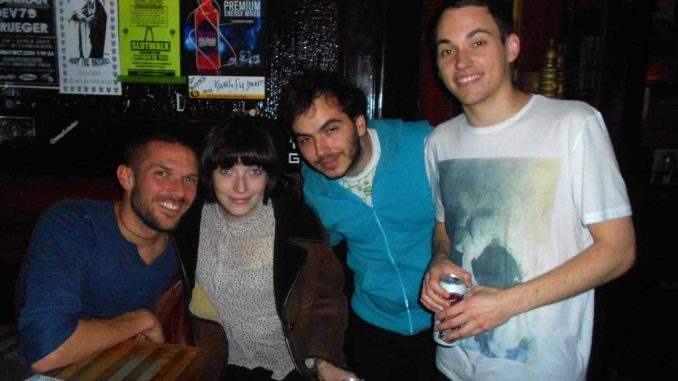

Some people are born entertainers. They crave spotlight, and will use whatever art form they’re best at as a means to get attention. Others perform because their art is so engrained in who they are that they have no choice but to make it and share it – because it is the fundamental means through which they process their experiences and engage with their lives. The three members of Daughter belong to the latter camp.
Despite rapidly gaining notoriety following their formation in late 2010, Elena Tonra, Igor Haefeli and Remi Aguilella don’t foster delusions of grandeur, glamour or world domination. Rather, they have been taking their success in stride and maintaining a remarkable sense of humility and gratitude for having found a band that they’re excited about making music with.
Their unique sound combines Tonra’s hauntingly ethereal voice and gut-wrenchingly poetic lyrics with Haefeli’s production skills and innovative musicality and Aguilella’s percussive heartbeat to create music that falls somewhere within the net of experimental folk.
Though the band is only rounding the corner of its two-year anniversary, Daughter has already acquired contracts with two independent labels, recorded two EPs and a full-length album, toured across Europe and is now embarking on its first U.S. tour. The group played at Kung Fu Necktie, 1250 N. Front St., on Oct. 16.
THE TEMPLE NEWS: Tell me about your background. How did you get together?
IGOR HAEFELI: I met [Tonra] at [The Institute of Contemporary Music and Performance in London] and we started doing music together there with [Aguilella] a bit after we finished, around December 2010, and it all just sort of fell together.
ELENA TONRA: We recorded “His Young Heart,” our first EP, which was very rough and homemade.
TTN: When did Aguilella join you?
IG: Kind of during that process when we started going on tour and stuff.
REMI AGUILELLA: We were all doing different programs in the school, and I think it was a great place to meet. They didn’t put us in a band together and say, “OK write some music.” I personally played with quite a few people and eventually played with [Haefeli] and [Tonra] and said, “These are the guys I would like to do more music with.”
TTN: Is there a structure to your songwriting?
ET: It’s a bit unstructured. In terms of “The Wild Youth,” it was very much songs written on guitar and voice. I would write the skeleton of the song. [Haefeli’s] more of the production side of things and then for rhythms and percussion, [Aguilella] would be involved in that. For the work we’ve done for the album it’s been based on a guitar loop or [Haefeli] has brought an ambient sound. We’ve really tried to come at sounds from a different perspective. It’s not always consciously about structure, just about sounds and things like that.
TTN: Is the live performance aspect the most challenging piece for you?
ET: The stage aspect is always going to be quite difficult. As a personality I don’t think I’ll ever quite be totally comfortable being on stage, which is quite funny that I’ve chosen to be in a band. It’s one of those love-hate – not love-hate – love-awkwardness relationships.
TTN: Has there been anything particularly challenging for you guys?
RA: People usually have this idea of being on the road, how it’s going to be like, especially friends and family. They don’t realize it’s going to be a lot of travel, a lot of dedication. It’s what I love personally so it’s fun to do it but it’s always weird to bring friends on board. Coming to see a sound check they don’t realize I’m going to be busy all day long even if it seems like I’m going to just be playing a show and that’s it.
IH: With every single thing comes pressure. Sometimes the sum of all those things is a bit hard to deal with. If I look at it in a bigger picture I really enjoy it and it’s all really good but every single thing is something to get stressed out or unhappy [about]. We’re still very much at the start. We’re still figuring out how things are, how we want things to be. It’s not like we’re a big band or anything.
TTN: Is there anything you absolutely love and wouldn’t trade for the world?
ET: As much as [being on stage] is nerve wracking, before you go on, you get stressed out and nervous. For me it’s probably also the best thing. Maybe it’s a vain thing. If an audience gets really into it that’s the best thing. I really feel like that’s it. It’s just getting the confidence to go out there in the first place.
Victoria Marchiony can be reached at vmarchiony@temple.edu.


Be the first to comment